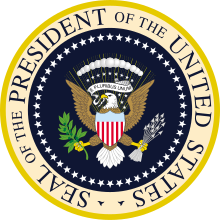List of Presidents of the United States
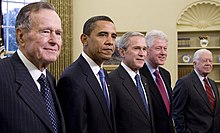
The list of Presidents of the United States completely enumerates the heads of state in the history of the United States of America . In addition to all persons who held the office as President of the United States after the US Constitution of 1789 came into force , the corresponding vice-presidents are also listed.
The numbering refers to the consecutive number of presidents and not to the number of terms of office . So if a president has two consecutive terms, he will still be listed only once. This also applies to Franklin D. Roosevelt, the only US president with more than two, namely four, terms in office because of the outbreak of World War II. An exception applies to Grover Cleveland , who was the only president to date to have two terms that did not follow one another. He is therefore listed as 22nd and 24th President, and accordingly the list for 44 presidents has 45 entries.
In the event of the President's resignation, death, or removal from office, the Vice President will advance to President's office for the remainder of the term and numbering will continue. So far, this has happened in nine cases. Eight presidents died in office ( Harrison 1841, Taylor 1850, Lincoln 1865, Garfield 1881, McKinley 1901, Harding 1923, Roosevelt 1945, and Kennedy 1963), with Lincoln, Garfield, McKinley, and Kennedy murdered . The ninth president, succeeded by his vice president, was Nixon , who stepped down as president in 1974.
During the American Civil War , Jefferson Davis was President of the Confederate States from 1861 to 1865 ; he is not counted as President of the United States.
For a better overview, the list is divided into four sections:
- From the War of Independence to the Civil War (1789–1861)
- From the Civil War to the Second World War (1861–1945)
- The time after World War II to the 21st century
- The time after the turn of the millennium
The colors in the first column stand for the party affiliation of the president; a color legend can be found at the end of the table . The life data of the respective president are in brackets under the names.
List of presidents

Symbols behind the name:
‡ Murdered
† died in office
↑ advanced Vice President
Ø resigned
Party color legend:
| colour | Political party |
|---|---|
| Republican Party | |
| Democratic Party | |
| Whig party | |
| Democratic Republican Party | |
| Federalist Party | |
| Non-party |
From the War of Independence to the Civil War (1789–1861)
| No. | President (life dates) |
Political party | Duration of the presidency | Term of office | Vice President | ||
|---|---|---|---|---|---|---|---|
| 1 |

|
George Washington (1732–1799) |
independent | April 30, 1789 March 4, 1797 |
1. | John Adams |

|
| 2. | |||||||
| Washington was the first president after the American War of Independence and is considered the "father of the American nation". The former general and hero of the Revolutionary War allowed himself to be put up for election by his contemporaries, somewhat reluctantly, and was unanimously elected as an undisputed individual candidate , alongside James Monroe as one of only two presidents. During his tenure, he set standards and created precedents that will shape all future presidencies. His services include the establishment of a functioning federal government and the development of a cabinet . Nonetheless, his politics were not always happy: A tax on alcohol led to the whiskey rebellion and politically the Jay Treaty was highly controversial. Washington advocated a neutral stance in the European coalition wars and enforced this policy in the Citizen-Genêt affair against a strong pro-French mood among the population. With his decision to forego a third term in office, he bound all of his successors - except for Franklin D. Roosevelt - to this requirement of only one re-election , which only became law in 1951 and has been in effect since Dwight D. Eisenhower's term in office . Both the capital of the United States, Washington, DC , and the US state of Washington are named after him. | |||||||
| 2 |
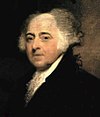
|
John Adams (1735-1826) |
Föd. | March 4, 1797 March 4, 1801 |
3. | Thomas Jefferson |

|
| Domestically, the presidency of John Adams was marked by intrigues and political squabbles, which are based on the development of the two-party system . The XYZ affair and the quasi-war with France showed that involvement in the European wars could hardly be avoided. In defense of the country, Adams enforced significant restrictions on democratic rights with the Alien and Sedition Acts , including restricting the freedom of the press vis-à-vis the government, increased military spending and ordered the establishment of the Ministry of the Navy . His greatest achievement was avoiding the seemingly inevitable war by negotiating with the French Foreign Minister Talleyrand and against resistance in his own party. In public he was often wrongly portrayed as a monarchist , which severely damaged him and his party. After his defeat in the election for the following term of office and the developing dominance of Jefferson's Democratic Republicans, Adams remained the only president of the federalists who had decisively influenced and promoted the creation of a presidential office a few years earlier. | |||||||
| 3 |

|
Thomas Jefferson (1743-1826) |
Democratic Rep. |
March 4, 1801 March 4, 1809 |
4th | Aaron Burr |

|
| 5. | George Clinton |

|
|||||
| The election of Jefferson to the presidency took place because of a vote tie, with his vice presidential candidate Aaron Burr in the Electoral College by the House of Representatives . The consequences of the controversial election were the groundbreaking ruling on constitutional jurisdiction and the constitutional amendment to the presidential election . With the Louisiana Purchase , the French colony Louisiana was acquired, thereby doubling the national territory. The Lewis and Clark expedition then dispatched was the first overland expedition from east to west coast, and Jefferson approved the funds for the first national road . The Tripolitan War was the first time that a military conflict took place outside its own borders. The Embargo Act , which was supposed to peacefully force Great Britain and France to respect neutrality, was an extraordinary failure that completely paralyzed American trade in particular. | |||||||
| 4th |

|
James Madison (1751-1836) |
Democratic Rep. |
March 4, 1809 March 4, 1817 |
6th | George Clinton | |
| not occupied (deceased) | |||||||
| 7th | Elbridge Gerry |

|
|||||
| not occupied (deceased) | |||||||
| Louisiana was the first state to be re-admitted from the former Louisiana Territories. Years of tension between the United States and Britain led to the British-American War , which divided the population. The American attempt to invade Canada and conquer the British colony failed miserably. On the contrary, the British managed the temporary occupation of Washington , during which they burned the White House and the Capitol . With the Peace of Ghent , the status quo ante bellum was restored and West Florida was accorded the United States. The positive effects of the war were greater industrial independence and faster economic growth. As a result, the federalists, who had initially resolutely opposed the war with part of the population, lost their last support as a national party. At the end of his two terms of office, a first customs law was passed, which was supposed to strengthen the domestic economy with protective tariffs . | |||||||
| 5 |

|
James Monroe (1758-1831) |
Democratic Rep. |
March 4, 1817 March 4, 1825 |
8th. | Daniel D. Tompkins |

|
| 9. | |||||||
| Monroe was the last president to know the American Revolution from personal experience. The time of his presidency is known as the "Era of Good Feeling" and coincided with the final end of the Federalist Party. He won his first election by a huge margin, in the second he had no opponent as a representative of the only major party. Only a wrongly voting elector prevented a unanimous result, as was the case with Washington. The first Seminole War resulted in further territorial gains and Indiana , Mississippi , Illinois , Alabama , Maine joined the federation. Missouri became a state after a compromise on slavery issues was found . The Spanish colony of Florida was acquired, and the Monroe Doctrine , co-authored by John Quincy Adams , at the end of his term in office, set America's foreign policy course for the following decades. The Liberian capital Monrovia is named after James Monroe. | |||||||
| 6th |
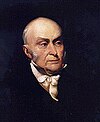
|
John Quincy Adams (1767-1848) |
Democratic Rep. |
March 4, 1825 March 4, 1829 |
10. | John C. Calhoun |

|
| John Q. Adams was the first president whose immediate relative (his father, John Adams ) had held that office. Because none of the four candidates from the same party received a majority in the Electoral College in the presidential election , the House of Representatives controversially decided on the election of the president. His defeated opponent Andrew Jackson accused Adams of corruption and then became his intimate enemy; the Democratic Republican Party split into Adam’s allies, the future National Republicans , and Jackson’s. Adams had to endure comparisons with his father, who was already criticized for his alleged British friendliness and authoritarian attitude during his tenure. His tenure was hapless and lackluster. Only the plans for a further transcontinental expansion of the states with canal ( Erie Canal and Illinois Waterway ) and railway projects ( Baltimore and Ohio Railroad ) were significant presidential achievements. | |||||||
| 7th |
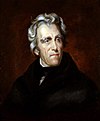
|
Andrew Jackson (1767-1845) |
Democrat | March 4, 1829 March 4, 1837 |
11. | John C. Calhoun | |
| not occupied (resigned) | |||||||
| 12. | Martin Van Buren |

|
|||||
| After Jackson's defeat by Adams, his supporters formed the Democratic Republican Party with the help of Martin Van Buren into a tightly organized large party and thus founded today's Democratic Party. Jackson is considered to be the first "People's President" because, on the one hand, he was the first to no longer belong to the founding fathers and came from a humble background, and on the other hand, his popularity with ordinary voters was enormous. After his inauguration, he introduced the spoils system , i.e. the appointment of new staff to offices in the federal authorities . The emerging abolitionism caused serious differences of opinion between northern and southern states , which are also evident in the nullification crisis . Arkansas and Michigan joined as states. The Indian Removal Act created the legal basis for the forced relocation of Indians east of the Mississippi . His veto against the extension of the Central Bank's charter, and especially his speech on its justification, are among the highlights of American democratic tradition. He was elected in 1832 as the first president after the abolition of census suffrage . | |||||||
| 8th |

|
Martin Van Buren (1782-1862) |
Democrat | March 4, 1837 March 4, 1841 |
13. | Richard Johnson |

|
| Martin Van Buren was the first President to be born a US citizen. He was also the only president to date whose mother tongue was not English , but Dutch . Until the election of George Bush , he was to remain the last president for a long time to be elected head of state from the office of vice-president. The economic crisis of 1837 was one of the worst in US history and the Caroline / McLeod affair led to renewed armed conflict with Great Britain. On the path of tears , around 4,000 of the 10,000 Indians who broke into the reservation died during a forced resettlement , and further forced resettlements led to the 2nd Seminole War . | |||||||
| 9 |
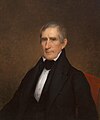
|
William Henry Harrison † (1773–1841) |
Whig | March 4, 1841 April 4, 1841 |
14th | John Tyler |

|
| Harrison was the first president of the Whig Party, which had formed after John Quincy Adams and Henry Clay's electoral defeats from the National Republicans and other groups such as former federalists as common opponents for the Democrats, who had dominated since Thomas Jefferson. Since their party leader Clay had already lost the presidential election twice, the Whigs selected former General Harrison, who had a reputation similar to Andrew Jackson, as their first candidate. To do this, they first demanded that he approve some of the bills contrary to the policies of the Democrats, such as the re-establishment of a national bank, the great aim of the Whigs. However, due to pneumonia - suffered after the longest inaugural speech held in spite of the bad weather - Harrison was the first US president to die while in office and was replaced by the incumbent vice president. At one month, this presidency was the shortest in US history. His grandson Benjamin Harrison was the 23rd US President from 1889 to 1893. | |||||||
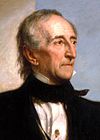
|
John Tyler ↑ (1790-1862) |
Whig (until Sept. 1841) independent |
April 4, 1841 March 4, 1845 |
14th | not occupied (moved up) | ||
|
10 |
Originally only scheduled to secure votes from the south, Tyler became the first vice president to rise to office following the elected president's death. During his tenure it was controversial whether he was to be regarded as a full-fledged or just acting president . However, he vehemently defended his claim to the position of full president, which means that the assumption of office is a precedent for all subsequent vice-presidents. In the constitution , advancement to the presidency was codified in 1967 by the 25th Amendment . In his political agenda, the former Democrat also showed his own clear line, rejected the plans agreed with Harrison and dismissed almost all previous ministers. He vetoed the re-establishment of the National Bank and numerous legislative proposals and was therefore soon expelled from his party, whereupon he partially collaborated with the Democrats. In terms of foreign policy, the Webster-Ashburton Treaty settled the decades-long border dispute with Canada, and the second Seminole War ended. Re-election in 1844 with the help of a democratic splinter group that shared his efforts to expand was in fact not possible. He therefore supported the nomination of the later President James K. Polk, who prevailed within the party against the former President and expansion opponent Van Buren as the Democratic candidate. In the final days of his tenure, Tyler ratified the admission of Texas and Florida to the Union in anticipation of Polk's expansion policy . | ||||||
| 11 |

|
James K. Polk (1795-1849) |
Democrat | March 4, 1845 March 4, 1849 |
15th | George M. Dallas |

|
| The election of the outsider Polk as a Democratic candidate in place of Martin Van Buren had a significant impact on American history. The annexation of Texas , which so far brought the largest state in terms of area to the federal government, combined with the belief in the “ divine mission to expand ”, led to the Mexican War . After the victory over Mexico, the Treaty of Guadalupe Hidalgo regulated the conquest of the entire present-day southwest. The Oregon Compromise with Great Britain set the border with Canada at the 49th parallel. At the end of his term of office, Polk was the first president to voluntarily renounce a second term. | |||||||
| 12 |
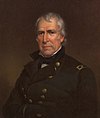
|
Zachary Taylor † (1784-1850) |
Whig | March 4, 1849 July 9, 1850 |
16. | Millard Fillmore |

|
| Taylor, who had never held political office before, owed his election primarily to his successful military career. During the 16 months of his reign, the dispute over slavery between northern and southern states intensified. Although himself a slave owner, he vehemently spoke out against further expansion of slavery in the newly won western territories. The start of the gold rush in the newly won area of California fell during his tenure. Taylor was the second president to die of natural causes during his tenure. | |||||||
| 13th |

|
Millard Fillmore ↑ (1800–1874) |
Whig | July 9, 1850 March 4, 1853 |
16. | not occupied (moved up) | |
| The success of Matthew Perry's expedition forced Japan to open up the country . The compromise of 1850 as a peaceful balance between the interests of the slave-holding southern states and the free north prevented the emerging secession for the time being . For the presidential election in 1852, his party did not nominate him for re-election. Another attempt for the presidency in 1856 as a candidate for the Know-Nothing Party was also unsuccessful. | |||||||
| 14th |

|
Franklin Pierce (1804-1869) |
Democrat | March 4, 1853 March 4, 1857 |
17th | William R. King |

|
| not occupied (deceased) | |||||||
| The Kansas-Nebraska Act nearly led to civil war between opponents and supporters of slavery. In addition to the successful Gadsden purchase , with which parts of Arizona and New Mexico were acquired, and the unsuccessful plan to buy Cuba or to conquer it by force, the term of office was characterized primarily by personal problems. An attempted re-election failed because his party's refused nomination. | |||||||
| 15th |
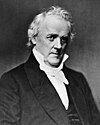
|
James Buchanan (1791–1868) |
Democrat | March 4, 1857 March 4, 1861 |
18th | John C. Breckinridge |

|
| The economic crisis of 1857 weakened the entire world economy. After the Dred Scott ruling , each state was free to decide on slavery. This led to the secession of the first southern states , with Buchanan doing nothing to stop the secession. According to his interpretation, the individual states had no right to leave the Union, but the US government could not have done anything to prevent them from doing so. In 1860 he did not run for re-election. Buchanan was the only unmarried president so far. | |||||||
From the Civil War to the Second World War (1861–1945)
| No. | President (life dates) |
Political party | Duration of the presidency | Term of office | Vice President | ||
|---|---|---|---|---|---|---|---|
| 16 |
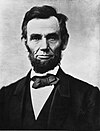
|
Abraham Lincoln ‡ (1809-1865) |
Rep. | March 4, 1861 April 15, 1865 |
19th | Hannibal Hamlin |

|
| 20th | Andrew Johnson |

|
|||||
| Lincoln's presidency was marked by the Confederate Civil War . After the secession of eleven slave-holding southern states , Lincoln led the northern states to victory, restored the Union and, with the 13th Amendment to the Constitution , resolved the abolition of slavery on the soil of the United States. Shortly after the Appomattox surrendered and his successful re-election in 1865, he was shot dead during a theatrical performance by a fanatical Southern sympathizer, actor John Wilkes Booth , making him the first president to be assassinated while in office. His presidency is now considered one of the most important in US history, as Lincoln's victorious Civil War prevented a north-south split in the United States and abolished slavery. But the problem of equal civil rights for African Americans , for whose equality Lincoln advocated, remained largely unresolved legally for another century until the tenure of Lyndon B. Johnson . | |||||||
| 17th |

|
Andrew Johnson ↑ (1808-1875) |
Democrat | April 15, 1865 March 4, 1869 |
20th | not occupied (moved up) | |
| Andrew Johnson served as Vice President under Abraham Lincoln for a month. Although both originally belonged to different parties, they ran together in the 1864 election as part of the National Union Party . After President Lincoln's assassination, Johnson rose to the post of president. The main task of his presidency after the end of the civil war was the social and economic reintegration of the southern states ( reconstruction ). However, this was made more difficult by significant differences between the President and the American Congress. Johnson vetoes against several laws aimed at improving the living conditions of blacks, but these were often overruled by Congress with the required two-thirds majority in both chambers. As a result of these differences, the first impeachment proceedings in American history took place in the spring of 1868, with the president being accused of violating the controversial Tenure of Office Act . However, one vote was missing in the Senate to resolve the impeachment, so Johnson remained in office. Johnson's purchase of Alaska was highly controversial at the time. At the end of his tenure, Johnson was not nominated by the Democrats as a candidate for the upcoming presidential election. | |||||||
| 18th |

|
Ulysses S. Grant (1822-1885) |
Rep. | March 4, 1869 March 4, 1877 |
21st | Schuyler Colfax |

|
| 22nd | Henry Wilson |

|
|||||
| not occupied (deceased) | |||||||
| The greatest challenge for the former commander in chief of the Union armies was the continuation of the reconstruction, which he ultimately carried out successfully. Grant pursued an ambivalent Indian policy. On the one hand, he appointed an Indian commissioner for Indian affairs for the first time , on the other hand, some bloody conflicts such as the Battle of Little Bighorn fell during his term of office . Grant tried to give Afro-Americans more rights, but especially in the southern states his ambitions were thwarted by strong domestic political resistance. In addition, Grant's presidency was remembered for the corruption scandals of its employees ( Whiskey Ring , Jay Gould and William W. Belknap ) and for the establishment of the first national park . A third term he sought in 1880 refused him his party with reference to the example of George Washington. | |||||||
| 19th |
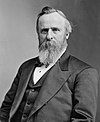
|
Rutherford B. Hayes (1822-1893) |
Rep. | March 4, 1877 March 4, 1881 |
23. | William A. Wheeler |

|
| The presidential elections were marked by significant irregularities. Hayes victory was only determined by a commission set up by Congress . During his tenure, the Gilded Age began . He did not stand for re-election in 1880. | |||||||
| 20th |
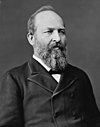
|
James A. Garfield ‡ (1831–1881) |
Rep. | March 4, 1881 September 19, 1881 |
24. | Chester A. Arthur |

|
| Garfield wanted the renewal of the corrupted state, but this was his undoing. After denying the insane Charles J. Guiteau a government position, Garfield was shot by the latter and died two and a half months later from the injury. | |||||||
| 21st |

|
Chester A. Arthur ↑ (1829-1886) |
Rep. | September 19, 1881 March 4, 1885 |
24. | not occupied (moved up) | |
| Arthur introduced reforms in the civil service to curb the rampant corruption. During his tenure, the US naval forces were also reorganized. Otherwise, his time at the White House was pretty uneventful. For the presidential election in 1884 he was not put up as a candidate by his party. | |||||||
| 22nd |
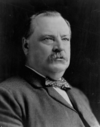
|
Grover Cleveland (1837-1908) |
Democrat | March 4, 1885 March 4, 1889 |
25th | Thomas Hendricks |

|
| not occupied (deceased) | |||||||
| In his first term of office, the Statue of Liberty was inaugurated in 1886 . Cleveland was the first and so far only President to marry in the White House. In 1886, when he was 49, he married 21-year-old Frances Folsom , which caused quite a stir . | |||||||
| 23 |
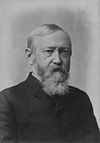
|
Benjamin Harrison (1833-1901) |
Rep. | March 4, 1889 March 4, 1893 |
26th | Levi P. Morton |

|
| Under his presidency, laws were passed to regulate the economy, such as the protectionist McKinley Tariff and the Sherman Antitrust Act , which were supposed to curb the formation of cartels and monopolies. For the first time, the state's annual spending exceeded the billion mark. Harrison was the only president who was the grandson of another president. His grandfather, William Henry Harrison, was the 9th President of the United States. | |||||||
| 24 |

|
Grover Cleveland (1837-1908) |
Democrat | March 4, 1893 March 4, 1897 |
27. | Adlai E. Stevenson |

|
| Cleveland is the only president to be re-elected to office after a hiatus. During his second term in office, the Chicago World's Fair and the Pullman strike, the largest workers' protest to date in American history, took place. | |||||||
| 25th |
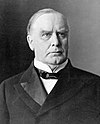
|
William McKinley ‡ (1843–1901) |
Rep. | March 4, 1897 September 14, 1901 |
28. | Garret Hobart |

|
| not occupied (deceased) | |||||||
| 29 | Theodore Roosevelt |

|
|||||
| McKinley pursued an imperialist policy that led to the annexation of Hawaii , the Spanish-American War with the occupation of the Spanish colonies ( Cuba , Puerto Rico and the Philippines ) and the Filipino-American War . He increased protective tariffs and pursued a policy based on the laissez-faire theory. During his tenure, the Gilded Age came to an end . Half a year after starting his second term, he was shot dead by Leon Czolgosz . | |||||||
| 26th |
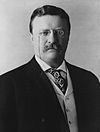
|
Theodore Roosevelt ↑ (1858-1919) |
Rep. | September 14, 1901 March 4, 1909 |
29 | not occupied (moved up) | |
| 30th | Charles W. Fairbanks |

|
|||||
| In terms of domestic and foreign policy, the president tried to balance the most diverse interests: Roosevelt campaigned for the cartels to restrict their power , officially received Booker Washington as the first African American in the White House, and founded a number of national parks to protect nature . He was the first president to receive the Nobel Peace Prize for his mediation in the Russo-Japanese War . During his first term of office, the Hay-Bunau-Varilla contract, which was decisive for the further construction of the Panama Canal , was concluded. | |||||||
| 27 |

|
William Howard Taft (1857-1930) |
Rep. | March 4, 1909 March 4, 1913 |
31. | James S. Sherman |

|
| not occupied (deceased) | |||||||
| Taft tried to consolidate the reforms initiated by his predecessor. In doing so, he got into an intra-party conflict between various interest groups. In terms of foreign policy, he continued the course of dollar diplomacy . As the only President, he later became Chief Justice of the United States. | |||||||
| 28 |

|
Woodrow Wilson (1856-1924) |
Democrat | March 4, 1913 March 4, 1921 |
32. | Thomas Riley Marshall |

|
| 33. | |||||||
| Wilson founded the Federal Trade Commission and the US Central Bank as part of a policy of social reform . In terms of foreign policy, Wilson initially sought a neutral position in World War I , which was only given up after the announcement of the " unrestricted submarine war " and the Zimmermann telegram became known in favor of the Entente entering the war . He was awarded the Nobel Peace Prize for his efforts to create the League of Nations . In his second term of office also the nationwide introduction of alcohol prohibition - against his veto - as well as the introduction of the right to vote for women - fell with his support. | |||||||
| 29 |
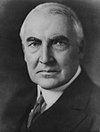
|
Warren G. Harding † (1865-1923) |
Rep. | March 4, 1921 August 2, 1923 |
34. | Calvin Coolidge |

|
| In his almost 29 months in office, Harding pursued a policy of non-interference in the economic and social areas. Due to numerous scandals in which members of his government were also involved, his presidency is regarded as unsuccessful. He presumably died of a stroke or heart attack in San Francisco while traveling the west . The final circumstances of his death are due to the request of his wife Florence been surviving autopsy still unknown. | |||||||
| 30th |

|
Calvin Coolidge ↑ (1872-1933) |
Rep. | August 2, 1923 March 4, 1929 |
34. | not occupied (moved up) | |
| 35. | Charles Gates Dawes |

|
|||||
| Coolidge was also an advocate of economic laissez-faire , a feature of the Roaring Twenties . The Johnson-Reed Act made the number of immigrants subject to a quota for the first time, the Federal Radio Commission installed media monitoring and the Briand-Kellogg Pact enshrined the prohibition of war of aggression in international law. | |||||||
| 31 |
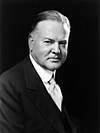
|
Herbert Hoover (1874–1964) |
Rep. | March 4, 1929 March 4, 1933 |
36. | Charles Curtis |

|
| Like his two Republican predecessors, Hoover also stands for an economic policy based on the laissez-faire principle. The " Black Thursday " of 1929 was the prelude to the Great Depression , the Hoover with the Hoover moratorium was looking to counter. Since his government was unable to mitigate the effects of the economic depression, his re-election in 1932 remained a hopeless endeavor. | |||||||
| 32 |
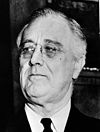
|
Franklin D. Roosevelt † (1882–1945) |
Democrat | March 4, 1933 April 12, 1945 |
37. | John N. Garner |

|
| 38. | |||||||
| 39. | Henry A. Wallace |

|
|||||
| 40. | Harry S. Truman |

|
|||||
| The New Deal bundled economic and social reforms and, with the help of the Works Progress Administration , mass unemployment and poverty were overcome. In terms of foreign policy, Roosevelt took the line of the Good Neighbor Policy and, after the outbreak of World War II , sought at least officially neutrality. Unofficially, the Allies were given military support at an early stage ( lending and leasing law ). The Japanese attack on Pearl Harbor forced the United States to enter the war. Perhaps because of this experience, Franklin D. Roosevelt was a major contributor to the creation of the United Nations . He was the only one whose presidency lasted more than two terms. The restriction, which was previously an informal principle, only became a formal law with a constitutional amendment in 1951. Shortly after the Yalta Conference , Roosevelt died of a cerebral haemorrhage at the age of 63 . | |||||||
The time after World War II to the 21st century
| No. | President (life dates) |
Political party | Duration of the presidency | Term of office | Vice President | ||
|---|---|---|---|---|---|---|---|
| 33 |
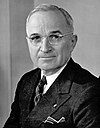
|
Harry S. Truman ↑ (1884–1972) |
Democrat | April 12, 1945 January 20, 1953 |
40. | not occupied (moved up) | |
| 41. | Albums W. Barkley |

|
|||||
| Truman, who had only been sworn in as Vice President 82 days before taking office, was confronted with numerous important events and decisions immediately after taking office due to Roosevelt's death: The Second World War ended in Europe a few weeks after he took office in May, and only afterwards in the Pacific the capitulation of Japan in September 1945 for good. The anti-Hitler coalition broke up and the Berlin blockade led to the first major conflict in the burgeoning Cold War . The McCarthy era began during the Truman presidency , when the Un-American Activities Committee hunted down real or perceived communists. From 1950 he ordered military intervention in the Korean War , in which the US came to the aid of the anti-communist South, which had been attacked by the North. In 1953, a short time after his departure, an armistice was agreed which, as it were, restored the pre-war state and is still in force today. Domestically, Truman tried under the slogan Fair Deal (based on the New Deal of his predecessor Franklin D. Roosevelt) to social reforms, especially in the health care system, but his advances were only partially accepted by Congress . The problem of the unequal rights of African Americans first came into public focus through his controversial presidential order to end racial segregation in the military. In 1952 he decided not to run again, which would have been admissible. | |||||||
| 34 |

|
Dwight D. Eisenhower (1890-1969) |
Rep. | January 20, 1953 January 20, 1961 |
42. | Richard Nixon |

|
| 43. | |||||||
| The originally independent Eisenhower, the most important US commander in World War II, was wooed as a candidate by both parties after Truman's renouncement because of his enormous popularity among the population. He finally decided to run for Republican, seeking a move after long years of Democratic rule. The Korean War ended with a ceasefire and the de facto partition of the country. Stalin died in 1953 , and from 1955 Eisenhower was faced with an increasingly aggressive and offensive Soviet Union on the international stage and responded with the Eisenhower Doctrine . The most important achievements of the presidency are the expansion of the national highway network and the establishment of NASA as a space agency. Although his presidency fell at a time of ideological polarization during the Cold War, Eisenhower was surprisingly differentiated and far-sighted in many ways. In 1954 he put an end to the bustle of Senator Joseph McCarthy , in contrast to his successors, he pursued a balanced Middle East policy and, in his farewell speech to the American people, warned urgently of the dangers of the military-industrial complex . Even his Conservative Vice President Richard Nixon was critical of Eisenhower, who was loved and admired by the Americans until the end of his term in office, and inflicted considerable damage on him in the election campaign against Kennedy with a derogatory remark to journalists. | |||||||
| 35 |
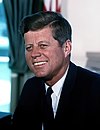
|
John F. Kennedy ‡ (1917–1963) |
Democrat | January 20, 1961 November 22, 1963 |
44. | Lyndon B. Johnson |

|
| The only 1,036 days (34 months) ending presidential Kennedys was marked by major foreign policy events: the failure of the Bay of Pigs Invasion of Cuba (April 1961), the announcement of the moon landing (May 1961), the construction of the Berlin Wall (August 1961) , the beginning of military engagement in the Vietnam War (e.g. Taylor-Staley Plan , March 1962) and the Cuban Missile Crisis due to the stationing of Soviet nuclear missiles (October 1962). Domestically, Kennedy sought reforms and supported the civil rights movement that called for the desegregation to be abolished. However, actual domestic political successes could not be achieved. On November 22nd, 1963, John F. Kennedy was murdered in Dallas in an assassination attempt that was never completely cleared up and around which numerous conspiracy theories have grown up to this day . | |||||||
| 36 |

|
Lyndon B. Johnson ↑ (1908-1973) |
Democrat | November 22nd, 1963 January 20th, 1969 |
44. | not occupied (moved up) | |
| 45. | Hubert H. Humphrey |

|
|||||
| Johnson took office after Kennedy's assassination in November 1963 and was confirmed in office a year later by regular elections with a large majority. Under Johnson, extensive social reforms were passed as part of the Great Society program : the Civil Rights Act of 1964 , which he enforced in Congress, abolished racial segregation and guaranteed African American equality. The Voting Rights Act explicitly gave blacks and other minorities the right to vote. Social programs meant that the number of US citizens living in poverty could be reduced by almost half during his tenure. The adoption of Medicare and Medicaid public health insurances and reforms in the education system were other priorities. However, the presidency was also shaped by the Vietnam War , against which growing sections of the population opposed, since the US armed forces did not succeed in defeating the communist North Vietnamese. This led to growing tensions and violent riots among the US population. In terms of foreign policy, Johnson achieved success through the ratification of the Nuclear Non-Proliferation Treaty and the Glassboro Conference . In 1968 he gave up another presidential candidacy. In the last year in office he reduced and stopped the bombing raids in Vietnam after peace negotiations with communists came about, but did not achieve a breakthrough by the time he retired. | |||||||
| 37 |

|
Richard Nixon Ø (1913–1994) |
Rep. | January 20, 1969 August 9, 1974 |
46. | Spiro Agnew |

|
| 47. | |||||||
| not occupied (resigned) | |||||||
| Gerald Ford |

|
||||||
| Because the tactic of area bombing he had chosen was unsuccessful, Nixon felt compelled to conclude a peace agreement in Vietnam that in fact amounted to surrender. This situation forced him to pursue an active policy of détente and he went on talks to Moscow and Beijing . The Nixon Doctrine provided for a withdrawal from the Asian region and defined the role of the USA as that of a regulatory power in the background. Domestic accomplishments included the founding of Amtrak , the National Weather and Ocean Agency, and the Drug Enforcement Agency . In addition, the USA succeeded in landing the moon as announced by Kennedy . Ultimately, however, the name Nixon is permanently linked to the Watergate affair , which led to the only resignation of a president to date. A year before Nixon, Vice President Spiro Agnew had resigned, and Gerald Ford had been named as his successor. | |||||||
| 38 |

|
Gerald Ford ↑ (1913-2006) |
Rep. | August 9, 1974 January 20, 1977 |
47. | not occupied (moved up) | |
| Nelson Rockefeller |

|
||||||
| Ford was the only president to date who was never elected or sustained by popular electors . His predecessor as vice president, Spiro Agnew, had resigned over a corruption affair, and Nixon had named Ford as his successor. When Nixon was forced to resign, Ford followed him into office. Controversial was the pardon he granted Nixon for any offenses that might have been committed in office. Ford tried unsuccessfully to cope with the recession and inflation. In terms of foreign policy, he achieved success with a continuation of the policy of détente and the signing of the Helsinki Final Act in 1975. During his term of office, the United States withdrew completely from Vietnam after North Vietnamese troops had conquered Saigon and the last Americans fled the country. In the desired re-election in November 1976, he failed relatively narrowly due to his Democratic challenger Jimmy Carter. | |||||||
| 39 |

|
Jimmy Carter (born 1924) |
Democrat | January 20, 1977 January 20, 1981 |
48. | Walter Mondale |

|
| Carter's tenure was the first without open armed conflict since Hoover, but this state of affairs was achieved through an often contradictory foreign policy, which in some countries gave the impression of a "flagging" nation. Carter acted as a mediator in the negotiations on the Camp David I Agreement and led the SALT II talks . However, his efforts to end the hostage-taking of Tehran and the Soviet intervention in Afghanistan by non-military means failed. The domestic political commitment in the field of energy, education and environmental policy did not bring about a turnaround in the economic and social crisis. | |||||||
| 40 |

|
Ronald Reagan (1911-2004) |
Rep. | January 20, 1981 January 20, 1989 |
49. | George Bush |

|
| 50. | |||||||
| The staunch anti-communist aimed a massive armament to end the Cold War by shifting the “ balance of terror ” in favor of the USA. The president was also not very squeamish about foreign policy, for example in the Iran-Contra affair and the invasion of Grenada . The economic policy he pursued (" Reaganomics ") led to increasing prosperity, but this was generated primarily at the expense of a record budget deficit . | |||||||
| 41 |

|
George Bush (1924-2018) |
Rep. | January 20, 1989 January 20, 1993 |
51. | Dan Quayle |

|
| After the collapse of the Warsaw Pact and as a result of the increasing paralysis of the Soviet Union, Bush proclaimed the “ New World Order ” and in this context also advocated German reunification . While UN Resolution 678 still provided the international legal basis for " Operation Desert Storm ", the invasion of Panama took place without international approval. The breach of his election promise (" Read my lips: no new taxes ") is the main reason for his failure to re-elect. | |||||||
| 42 |

|
Bill Clinton (born 1946) |
Democrat | January 20, 1993 January 20, 2001 |
52. | Al Gore |

|
| 53. | |||||||
| Clinton made various reforms to combat drug abuse, gun violence and poverty. Its primary goals were to lower national debt and introduce general health insurance. The Kyoto Protocol was signed (but not ratified) and with the founding of NAFTA an extensive free trade area was created between Canada, the USA and Mexico. While he was pursuing a policy of reconciliation with former enemies China and Russia and brokering the Dayton Peace Agreement , al-Qaeda created a new threat to the security of the country. The end of his second term was overshadowed by the “bursting of the dot-com bubble ” and the Lewinsky affair , as a result of which an unsuccessful impeachment proceedings against Clinton were initiated. | |||||||
The time after the turn of the millennium
| No. | President (life dates) |
Political party | Duration of the presidency | Term of office | Vice President | ||
|---|---|---|---|---|---|---|---|
| 43 |

|
George W. Bush (* 1946) |
Rep. | January 20, 2001 January 20, 2009 |
54. | Dick Cheney |

|
| 55. | |||||||
| George W. Bush was elected President with one of the tightest results in United States history . B. in the state of Florida , which has been known as the swing state in US presidential elections for decades , lasted more than a month, after all, Bush was there with only 537 votes ahead of his Democratic challenger Al Gore . Overall, Gore had a lead of around 500,000 votes in the USA; Bush was able to get four more electoral votes than Gore. Despite a supreme court review and the ordering of recounts in some constituencies by the US Supreme Court , the outcome of the election continues to cause discussions today. After the terrorist attacks of September 11th , Bush proclaimed the war on terror and with the USA PATRIOT Act enacted the corresponding legal basis for counter-terrorism, combined with restrictions on civil rights. Domestically, the establishment of the Ministry of Internal Security was a further step. In terms of foreign policy, he waged a series of wars against the so-called rogue states . These include armed conflicts with the Taliban and the fight against Saddam Hussein , which was waged by a “ coalition of the willing ” in the Iraq war . But neither these wars nor the search for Osama bin Laden or the final dismantling of the al-Qaeda network was granted real success. While the Bush doctrine still showed the unilateral attitude of the president, at the end of the second term of office there were increasing signs of a political orientation towards the nations of the UN and NATO . Domestically, his presidency ended in the greatest financial crisis since the Great Depression of 1929. Due to immense losses in the real estate market, stock exchanges around the world were upset, as a result of which a number of financial institutions (including Lehman Brothers ) went bankrupt . |
|||||||
| 44 |

|
Barack Obama (* 1961) |
Democrat | January 20, 2009 January 20, 2017 |
56. | Joe Biden |

|
| 57. | |||||||
| Barack Obama was the first African American President of the United States; at the same time he was the first US president to be born outside the American continent, namely in Hawaii . He took office during a global financial crisis and one of his first acts was to implement a stimulus package worth $ 787 billion. In 2009 he was awarded the Nobel Peace Prize for his exceptional efforts to strengthen international diplomacy and cooperation between peoples . In the spring of 2010, he implemented a large-scale and controversial healthcare reform that gave millions of Americans access to health insurance for the first time. On May 1, 2011, he was able to announce the killing of the terrorist Osama bin Laden, who had been wanted for years, by a US commando. In November 2012, Obama was confirmed for a second term. In spring 2015, after more than 50 years of diplomatic crisis, Obama sought contact with Cuba and significantly improved political relations. He also tried to find a compromise in the nuclear negotiations with Iran , and he succeeded in reaching a corresponding agreement. Especially towards the end of his term in office, Obama was particularly concerned about climate protection. He supported international agreements on global climate protection. The result was an international climate protection agreement , which was signed by almost all countries in the world at the UN climate conference in Paris in 2015 . In domestic politics, too, he set environmental policy accents, above all through the Clean Power Plan , which for the first time in US history set binding guidelines for companies to reduce CO 2 emissions. |
|||||||
| 45 |
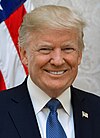
|
Donald Trump (* 1946) |
Rep. | since January 20, 2017 | 58. | Mike Pence |

|
| With the real estate entrepreneur, entertainer and billionaire Trump first time a candidate managed to election as president , who had never previously held a political or military office; at the age of 70 he was also the oldest president when he took office. He won after a highly polarizing election campaign under the motto " Make America Great Again "; his election win is classified by himself as well as by observers and commentators as a "turning point" both for the USA and globally and led to protests by opponents of his politics . He introduced his administration's policy in his inauguration speech under the slogan " America First ". In terms of climate policy, he is turning around compared to his predecessor, and he is also critical of international agreements, as he sees these disadvantages and restrictions for the USA. His economic policy is based on Ronald Reagan's " Reaganomics ". See also Donald Trump's presidency . | |||||||
See also
- List of attacks on the President of the United States
- Presidential election in the United States
- List of Vice Presidents of the United States
literature
- Peter Schäfer: The presidents of the USA in life pictures. Komet, 2nd edition, Cologne 2005, ISBN 3-89836-450-X
- Klaus-Jürgen Matz: Who ruled when? Regent tables for world history. From the beginning to the present. dtv, 5th edition, Munich 2001, ISBN 3-423-32523-2 .
Web links
- www.american-praesidents.de: The history of the US presidents
- Miller Center of Public Affairs , millercenter.org: American President: A Reference Resource (English)
- www.whitehouse.gov: The Presidents of the United States (English)
- Robert S. Summers, www.ipl.org: POTUS: Presidents of the United States (English)
Individual evidence
- ↑ see also the inaugural address of John F. Kennedy
- ↑ engl. " Popular Vote "
- ↑ see 2000 US presidential election # overall result
